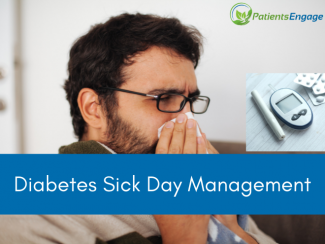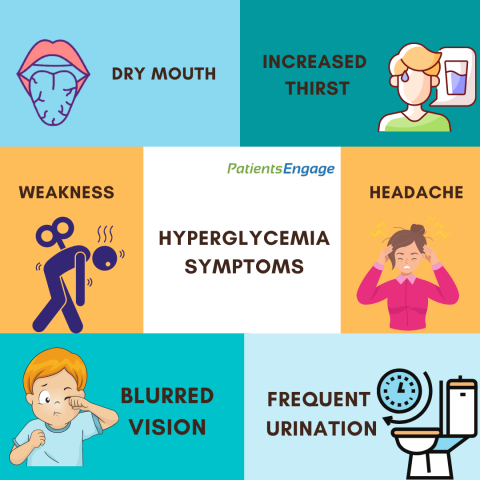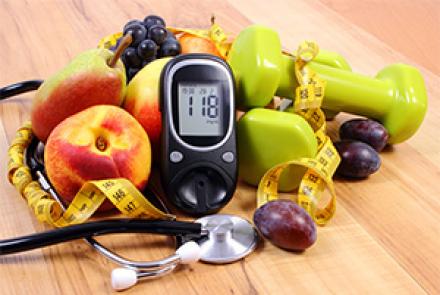
If you have diabetes, your chances of getting an infection are higher than a person without diabetes. Having a cold, flu, COVID-19 or any other infection can then cause your blood glucose levels to increase. Thus, knowing how to handle such days and being prepared can prevent distress and complications that can occur due to hypergylcemia or high glucose levels in blood.
What happens when you fall sick?
When the body is unwell due to an infection or allergy, the immune system gets activated and certain hormones are released to help fight the ailment. These hormones however raise the blood glucose levels in spite of the presence of insulin in the body. Thus, persons with diabetes are at a risk of raised glucose levels even with minor ailments like a cold or flu. This can lead to a state of diabetic ketoacidosis (where the glucose converts fat into ketones) which can be life-threatening.
Illness likely to affect your blood sugar levels
Illness such as infections, cardiovascular events, dehydration or electrolyte imbalance can all lead to fluctuation in the blood glucose levels. Some of the common infections known to affect Persons with Diabetes include:
- Common cold, flu, sore throat.
- Respiratory infections like Covid-19, Bronchitis etc.
- Gastrointestinal problems like food poisoning, upset stomachs, vomiting, diarrhea etc.
- Skin infections like rash, abscesses etc.
- UTIs and bladder infections
Related Reading: Medicines that alter blood glucose levels

How to be prepared?
Watch out for symptoms/ signs of any illness. Fever is always a clear sign of infection.
Speak to your Care team beforehand and discuss what your blood glucose levels should be in the event of an illness. Discuss new targets, how to adjust medications, when and how often to monitor glucose & ketone levels and when to call the doctor during a sick day.
Keep a thermometer, glucometer and BP machine at home for easy monitoring.
Keep a few over-the-counter pain and fever reducing pills which can be taken immediately when prescribed by your doctor.
Educate your family members about your list of medications and signs of hypergylcemia.
Keep a list of your doctors and local pharmacists and their contact numbers handy(on your fridge, phone or room).
What to do on a sick day?
- Do not skip on your diabetes medications including insulin. Take them on time as you would on any day even if you are not eating and drinking like normal.
- Use a glucometer to check your blood glucose levels 4 times a day. Keep a log of your recorded levels to show your doctor.
- Drink plenty of fluids to avoid dehydration. A cup of water every hour is a good measure of fluid. Avoid tea, coffee and sodas that are high in calories and caffeine. Opt for water, soups and plain yogurt drinks.
- Try to eat normal meals. If you are unable to eat normally or have nausea/vomiting, then have some sugary drinks to prevent drop in sugar levels. However, make sure you monitor the intake of the sugar in these drinks.
- To prevent hypoglycemia (low glucose levels) when you are unable to eat regular meals, instead try having have some light snacks like dry toasts, crackers, parathas/roti, or biscuits.
- Weigh yourself everyday because unwanted weight loss is a sign of high blood glucose.
- Check your temperature for fever frequently. It is an indication of infection.
- Watch your blood pressure levels. Blood pressure may decrease if there is less fluid intake and dehydration.
When to seek medical attention?
- Call your doctor and inform him about your symptoms and blood glucose levels so he/she can advise you on how to take care of it and if you need to come in for physical check-up.
- If you are having frequent vomiting or diarrhea (more than 3 times a day)as this can quickly cause dehydration in the body. Ask your doctor if any medicines need to be altered.
- If your blood glucose levels are above 240 mg/dl even after taking your medications on time.
- If you have unresolving or high fever (above 103.5F).
- If you are having difficulty breathing, dizziness, confusion or severe pain.
- Persons with diabetes and their care providers should be aware of Diabetic Ketoacidosis so that you can seek immediate medical attention if any of the signs or symptoms are present. These include:
- Blood glucose levels above 270 mg/dl
- Presence of ketone in urine while doing a home ketone test
- Excessive thirst
- Increase in heart rate
- Fruity smelling breath
Read this: What to do when your blood sugar falls
Note: Remember not to stop your medications for Diabetes on your own. Check with your doctor and follow your doctor’s advice on any changes in your doses.
People with Type 1 Diabetes must keep a close eye on their insulin levels and follow insulin adjustment protocol as prescribed by their doctor.
















